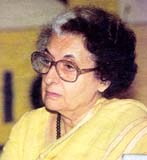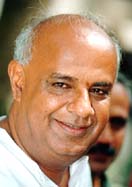Commentary / Mani Shankar Aiyar
Governance in our democracy is inadequate primarily because we are an unrepresentative democracy
 And if, for any reason, this leader of India (not just Karnataka)
cannot get himself a seat from Karnataka, is there nowhere else
in India that the people might want him? After all, Indira Gandhi
represented not Rae Bareli in Uttar Pradesh but Medak in Andhra
Pradesh in the Seventh Lok Sabha (1980 to 1984).
And if, for any reason, this leader of India (not just Karnataka)
cannot get himself a seat from Karnataka, is there nowhere else
in India that the people might want him? After all, Indira Gandhi
represented not Rae Bareli in Uttar Pradesh but Medak in Andhra
Pradesh in the Seventh Lok Sabha (1980 to 1984).
In any case, what is the hurry? The law permits Deve Gowda to
continue as prime minister without being an MP till December.
Surely it would be more democratic to have an unelected prime
minister for a few more weeks than an effectively unelected one
indefinitely. And if the Hegde factor makes it politically dangerous
for the PM to chance his hand in this round, can he not be asked
to get his Karnataka act together after his understandable present
preoccupation with UP is behind him? And if even then, no constituency
in India would want him, then cannot the Janata Dal find someone
else to lead them who has the backing of at least one of our 542
constituencies?
 After all, Deve Gowda was no one's first choice
-- and everyone's last choice. The UF government could continue
with someone else at the helm. Nothing, however, could be more
damaging to our democracy than for the 50th anniversary of our
democracy to be celebrated by an unrepresentative government with
an unelectable head. That would be the final degradation.
After all, Deve Gowda was no one's first choice
-- and everyone's last choice. The UF government could continue
with someone else at the helm. Nothing, however, could be more
damaging to our democracy than for the 50th anniversary of our
democracy to be celebrated by an unrepresentative government with
an unelectable head. That would be the final degradation.
The Emergency of 1975 to 1977 showed how easy it is to slide down the
slippery path of authoritarianism. It is a moot point whether
Indira Gandhi was defeated in 1977 because there was popular revulsion
against the fall from democratic rectitude or because the Emergency
raised the index of Opposition unity to unprecedented heights.
The fact is that democracy, as we understand it, was the exertions
of those languishing in jail but because of the recognition of
the ruling establishment that without democracy the country is
ungovernable.
The enduring lesson of the Emergency is, therefore,
that any increase in democracy increases the country's capacity
to govern itself. An increase in democracy is, thus, the first
task of good governance.
Governance in our democracy is inadequate primarily because we are
an unrepresentative democracy. We may be the world's largest
democracy; we are, at the same time, the world's least-representative
democracy. Leave alone democracies which are more representative,
there are authoritarianisms in our neighbourhood that are more
representative than our democracy.
Singapore, I would imagine, is a telling example. The Lee Kwan
Yew model would not be recognised by any Indian as 'democratic.'
Their system is most akin to what our Constitution would call a
permanent Emergency. If, however, for all its lack of freedom
the Singaporean authorities can disguise their iron hand in the
glove of what they call 'Asian values,' it is because
of two major factors.
One is if India's single-biggest achievement
is democracy, Singapore's is growth. But while Indians are disillusioned
with democracy, Singaporeans are thrilled with growth. They chafe,
as begging Lee's pardons, all human beings, 'Asian' or otherwise,
chafe at restrictions on personal and political freedom, but this
has not become -- at least, not yet become -- a destabilising
political combustion because of the second major factor mentioned
above.
It is that although Singapore's is an authoritarian polity, it
is a representative authoritarianism in that it does have a parliament,
a parliament which is, in effect, disenfranchised from politics
but deeply involved in everyday matters of the civic life of its
citizens, their well-being and their continued prosperity.
The Singapore parliament has a membership of 81. With a population
of about 2.5 million, this means there is one MP for every 30,000,
comparable to the number of Britons a British MP
represents in Westminster. In India, each MP represents between
one-and-half million to two million Indians. With a population
nearly 20 times the United Kingdom's, there are fewer seats in
the Lok Sabha than in the House of Commons.
|





 And if, for any reason, this leader of India (not just Karnataka)
cannot get himself a seat from Karnataka, is there nowhere else
in India that the people might want him? After all, Indira Gandhi
represented not Rae Bareli in Uttar Pradesh but Medak in Andhra
Pradesh in the Seventh Lok Sabha (1980 to 1984).
And if, for any reason, this leader of India (not just Karnataka)
cannot get himself a seat from Karnataka, is there nowhere else
in India that the people might want him? After all, Indira Gandhi
represented not Rae Bareli in Uttar Pradesh but Medak in Andhra
Pradesh in the Seventh Lok Sabha (1980 to 1984).
 After all, Deve Gowda was no one's first choice
-- and everyone's last choice. The UF government could continue
with someone else at the helm. Nothing, however, could be more
damaging to our democracy than for the 50th anniversary of our
democracy to be celebrated by an unrepresentative government with
an unelectable head. That would be the final degradation.
After all, Deve Gowda was no one's first choice
-- and everyone's last choice. The UF government could continue
with someone else at the helm. Nothing, however, could be more
damaging to our democracy than for the 50th anniversary of our
democracy to be celebrated by an unrepresentative government with
an unelectable head. That would be the final degradation.